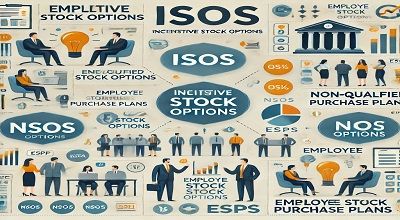Stock Options
Stock options are a form of compensation that companies use to attract, retain, and motivate employees and executives. They grant the holder the right, but not the obligation, to buy or sell a specific number of shares of the company’s stock at a predetermined price, known as the strike price, within a specified period. Stock option can be a valuable part of an employee’s compensation package, offering the potential for significant financial rewards if the company’s stock price increases over time. This article will explore the latest aspects of stock option, including their types, benefits, risks, and how they are evolving in today’s corporate environment.
Types of Stock Options
- There are primarily two types of stock option: Incentive Stock Option (ISOs) and Non-Qualified Stock Option (NSOs).
- Incentive Stock Options (ISOs): ISOs are offered exclusively to employees and offer potential tax benefits to the holder. When exercised, if certain conditions are met, the gains may be taxed at the capital gains rate rather than ordinary income tax rates.
- Non-Qualified Stock Options (NSOs): NSOs can be granted to employees, directors, contractors, and others. They do not qualify for special tax treatments like ISOs and are taxed as ordinary income upon exercise.
Benefits of Stock Options
Stock options offer several benefits to both the recipient and the issuing company:
- Alignment of Interests: They align the interests of employees with those of shareholders. As the company’s stock price increases, the value of stock option also rises, incentivizing employees to contribute to the company’s success.
- Attractive Compensation Package: For startups and companies with limited cash flow. Stock option are a way to attract top talent by offering the potential for substantial future rewards.
- Tax Benefits: Especially with ISOs, employees might enjoy favorable tax treatment under certain conditions. Such as paying taxes at capital gains rates rather than ordinary income rates.
Risks and Considerations
While stock options can be lucrative, they also come with risks:
- Market Risk: The value of stock option is tied to the company’s stock price, which can fluctuate widely due to market conditions. Potentially rendering option worthless if the stock price falls below the strike price.
- Vesting Periods: Options typically come with vesting schedules, requiring employees to stay with the company for a certain period before they can exercise their options. Which can be a double-edged sword in terms of employee retention and mobility.
- Tax Implications: Incorrect management of stock options, especially around the exercise period, can lead to significant tax liabilities for the holder.
Evolving Trends in Stock Options
The landscape of stock options is evolving with changing market conditions and workforce dynamics:
- Greater Transparency: Companies are now more transparent about their stock option plans. Offering employees better information on the terms and potential value of their option.
- Flexibility and Innovation in Compensation Packages: With the rise of remote work and the gig economy, companies are getting creative in how they structure stock option. Including offering more flexible vesting schedules and considering alternative forms of equity compensation.
- Focus on Financial Education: Recognizing the complexity of stock option, many companies are investing in financial education programs for their employees to help them make informed decisions about their options.
Conclusion
Stock options remain a vital component of employee compensation packages, offering the potential for substantial rewards. However, they also require careful consideration of the risks and tax implications involved. As the corporate world continues to evolve, so too will the structures and strategies surrounding stock option. Reflecting broader changes in the economy, workforce expectations, and regulatory environment. Understanding these dynamics is crucial for both companies offering stock option and the employees receiving them.
